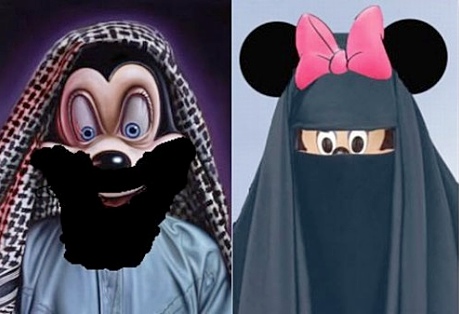It’s been official U.S. government policy for decades to promote democracy around the world. The assumption seems to be that majorities everywhere really want western-style freedoms if they just get a chance to vote for them. Well, guess what? They don’t.
In many places, all the majority really want is to control people who don’t agree with them. I’ve talked before about how freedom and democracy aren’t the same things, but the people of Egypt — newly “freed” from a longtime dictator — seem to be trying to create a textbook case of a democratic tyranny.
In recent voting, Islamists have taken close to two thirds of the seats in the country’s first post-revolution parliament. Roughly 37 percent of the parliament will be held by the Muslim Brotherhood alone. We might be having a look at the future for Egypt right now, though, because a wealthy businessman made the mistake of tweeting the cartoon above — as a joke about how Mickey and Minnie Mouse would be required to look if the religious parties win.
The businessman — who’s a Coptic Christian — faces trial for “insulting Islam.”
This is the heart of the problem with a majoritarian system. All it does is allow the majority to get their way. It doesn’t protect individuals. It doesn’t protect minorities. It’s purely about the exercise of power by the majority. So what happens when the majority are wrong? What happens when the majority don’t want individual freedom — of speech, religion, assembly or any of the other rights we’re supposed to take for granted?
Despite what you might have been taught in school, democracy doesn’t ensure that we have freedom. This country wasn’t even supposed to be a democracy, because the founders understood the problems inherent in it. What they gave us was flawed enough, but at least it was a republic, which was designed to prevent a majority from enforcing their will on everybody else.
Egypt is fast becoming a model democracy. The country has multiple legal parties that compete in elections. It is setting up a representative government that will carry out the will of the majority. But that doesn’t make it free. In many ways, the democratic country will be less free than the “dictatorial” country was.
In 1979, Iran exchanged a secular dictator for a religious dictatorship. Are the people freer? Not really. They just have different things they can do and not do. When you don’t have freedom, your privileges change at the whim of the dictator in power.
And when the powers that be don’t believe in jokes involving their religion, don’t make religious jokes, because you’re certainly not free.

 The things we regret the most show us what we really value
The things we regret the most show us what we really value Penn & Teller: ‘Carny trash’ who became stars with original art
Penn & Teller: ‘Carny trash’ who became stars with original art